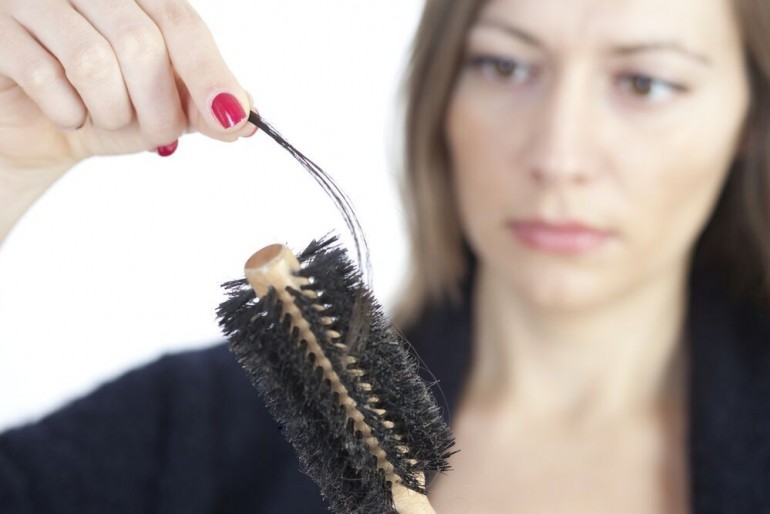
Hair loss in women is both common and treatable. Here’s what you should know.
Hair loss just happens in men, right? It turns out about 50 – 75% of women also have hair loss and it often happens around the time of menopause. The difference is that men tend to have receding hairlines and large bald spots in the middle or backs of their heads; women tend to lose hair from all over their scalp and each individual hair tends to get thinner. Because of the way female hair loss occurs, it can go almost unnoticed until as much as 50% of hair is lost.
About 50 – 75% of women also have hair loss and it often happens around the time of menopause.
1. How do I know if I’m losing my hair?
You may notice a lot more hair coming out on your brush or one the bottom of the tub. You may also notice your pony tail is thinner and the part in your hair is getting wider.
2. What should I do first?
First go see your doctor. Hair loss may be a symptom of menopause but it can also be do to certain health problems and you want to be sure it isn’t a sign of an illness.
3. What are some of the causes of hair loss in menopause?
Like most menopause symptoms, it can be due to a drop in the hormones estrogen and progesterone. But there are many more causes. Some of the most common include:
- Thyroid disease. Low thyroid hormones happen in about five percent of women around menopause and hair loss is one of the common symptoms. Checking your thyroid hormone level will make the diagnosis along with a good history and physical exam.
- In addition to its many other symptoms, people with diabetes can have hair loss. Some of it is due to poor circulation in the scalp, some of it is due to the stress and anxiety of the diagnosis, some due to increases in insulin, and some of it can be due to being more susceptible to certain fungal diseases of the scalp such as ringworm. Controlling your blood sugar also helps to control hair loss.
- Poor nutrition. Hair is a protein and poor nutrition for any reason can and often does cause poor hair growth. Crash diets, iron and biotin deficiencies can also be causes
- Chronic stress. Stress does a number on all of your body and hair loss is one more possible symptom that stress is causing.
- Genetics. We inherit a lot of things from our parents and hair loss can be one of those things.
- Certain medications. Hair goes through growth phases: anagen, which is the growth phase that can last for two to six years; telogen which is the rest phase where it doesn’t grow and can last for about three months; and after that, hair falls out naturally. Some medications make hair stop growing or stay in telogen phase longer, or fall out. If you have begun any new medication and notice hair changes, ask your doctor if there could be a connection. Some examples are:
– Acne medications containing vitamin A (retinoids)
– Some antibiotics and antifungal drugs
– Antidepressants
– Birth control pills
– Cholesterol-lowering drugs
– Many cancer treatment drugs
– Epilepsy drugs (anticonvulsants)
– Blood pressure medicines such as beta-blockers, ACE inhibitors, and diuretics
– Steroids including testosterone
– Thyroid medications
4. What are the treatments for hair loss?
There are a number of treatments for hair loss and they vary in how successful they are. Here are some things that can be helpful:
- Control your stress. You may be amazed at how this can help. I have patients who became so stressed that all of their hair fell out and the only treatment for them was stress reduction and mental health therapy.
- Control your blood sugar, eat healthy, and get plenty of sleep and exercise. All of these things increase blood flow to your scalp, make you feel better and help improve hair loss.
- Biotin 300mg daily. Biotin has been show to improve hair follicles and nails. While this may not solve the problem, it may be helpful.
- Aromatherapy. Some alternative and complementary healers suggest using lavender, rosemary cedarwood and thyme to help with hair growth. It is very irritating if applied directly to the scalp so one or two drops of their essential oils are mixed into a tablespoon of jojoba, grapeseed oil or extra virgin olive oil and apply to the scalp once or twice weekly. It’s best to work with someone familiar with these approaches for best results.
- Thyroid medication. If your thyroid hormones are too low or too high, thyroid medication is really an amazing treatment for hair loss.
- If there are no medical causes for your hair loss, ask your doctor about Minoxidil. It is also known as Rogaine, and it is the only FDA-approved drug for treating female pattern hair loss. Most drug stores and some beauty supply stores have a 2% topical product that you can purchase over the counter. It is rubbed on the scalp twice daily in the areas where hair is thin. Unfortunately, once the medication is stopped, most of the gained hair is lost. Ask your doctor about side effects.
- A medicine used to treat diabetes is sometimes used in certain circumstances.
- Other treatments. There are a number of treatments that are being tried, mostly by hair loss specialists. They include an off-label use of Finasteride (a medicine usually used for men with an enlarged prostate gland) only for menopausal women, low-level laser treatment of the scalp, platelet-rich plasma injections (PRP, also called the “vampire hair growth treatment”) and injections of stem cells (these latter two are both still somewhat experimental).
5. How long does it take to see a difference?
The first thing to know is don’t get discouraged; it takes about 3-4 months to see if there is a change once you start a new treatment so don’t be surprised or want to change your treatment if you don’t see a difference quickly. You may still get the outcome you are looking for. Because the loss of hair can be very upsetting and lower self-esteem, seeing a mental health person can also be helpful both in dealing with feelings and in helping to lower stress that can contribute.





